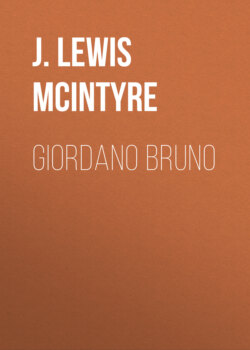Читать книгу Giordano Bruno - J. Lewis McIntyre - Страница 3
На сайте Литреса книга снята с продажи.
PREFACE
ОглавлениеTable of Contents
This volume attempts to do justice to a philosopher who has hardly received in England the consideration he deserves. Apart from the Life of Giordano Bruno, by I. Frith (Mrs. Oppenheim), in the English and Foreign Philosophical Library, 1887, there has been no complete work in our language upon the poet, teacher, and martyr of Nola, while his philosophy has been treated only in occasional articles and reviews. Yet he is recognised by the more liberal-minded among Italians as the greatest and most daring thinker their country has produced. The pathos of his life and death has perhaps caused his image to stand out more strongly in the minds of his countrymen than that of any other of their leaders of thought. A movement of popular enthusiasm, begun in 1876, resulted, on 9th June 1889, in the unveiling of a statue in Rome in the Campo dei Fiori, the place on which Bruno was burned. Both in France and in Germany he has been recognised as the prophet, if not as the actual founder, of modern philosophy, and as one of the earliest apostles of freedom of thought and of speech in modern times.
The first part of the present work—the Life of Bruno—is based upon the documents published by Berti, Dufour, and others, and on the personal references in Bruno’s own works. I have tried to throw some light on Bruno’s life in England, on his relations with the French Ambassador, Mauvissière, and on his share in some of the literary movements of the time. I have, however, been no more successful than others in finding any documents referring directly to Bruno’s visit to England.
In the second part—The Philosophy of Bruno—I have sought to give not a systematic outline of Bruno’s philosophy as a whole under the various familiar headings, which would prove an almost impossible task, but a sketch, as nearly as possible in Bruno’s own words, of the problems which interested this mind of the sixteenth century, and of the solutions offered. The first chapter points out the sources from which Bruno derived the materials of his thinking. The succeeding chapters are devoted to some of the main works of Bruno—the Causa (Chapter II.), Infinito and De Immenso (Chapters III. and IV.), De Minimo (Chapter V.), Spaccio (Chapter VI.), and Heroici Furori (Chapter VII.)—and contain as little as possible of either criticism or comment, except in so far as these are implied in the selection and arrangement of the material. I have adopted this method partly because Bruno’s works are still comparatively unknown to the English reader, and partly because his style, full as it is of obscurities, redundances, repetitions, lends itself to selection, but not easily to compact exposition. Several phases of Bruno’s activity I have left almost untouched—his poetry, his mathematical theories, his art of memory. The eighth chapter turns upon his philosophy of religion, about which there has been much controversy; while the last attempts to bring him into relation and comparison with some of the philosophers who succeeded him. I subjoin a list of works and articles which are of importance for the study of Bruno. Throughout I have referred for Bruno’s works to the recent Italian edition of the Latin works, issued at the public expense, 1879 to 1891 (three volumes in eight parts, with introductions, etc.), and to Lagarde’s edition of the Italian works—Gotha, 1888. Of the latter there are two volumes, but the paging is continuous from one to the other, page 401 beginning the second volume.
J. LEWIS M‘INTYRE.
UNIVERSITY OF ABERDEEN,
16th July 1903.
